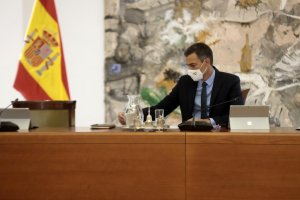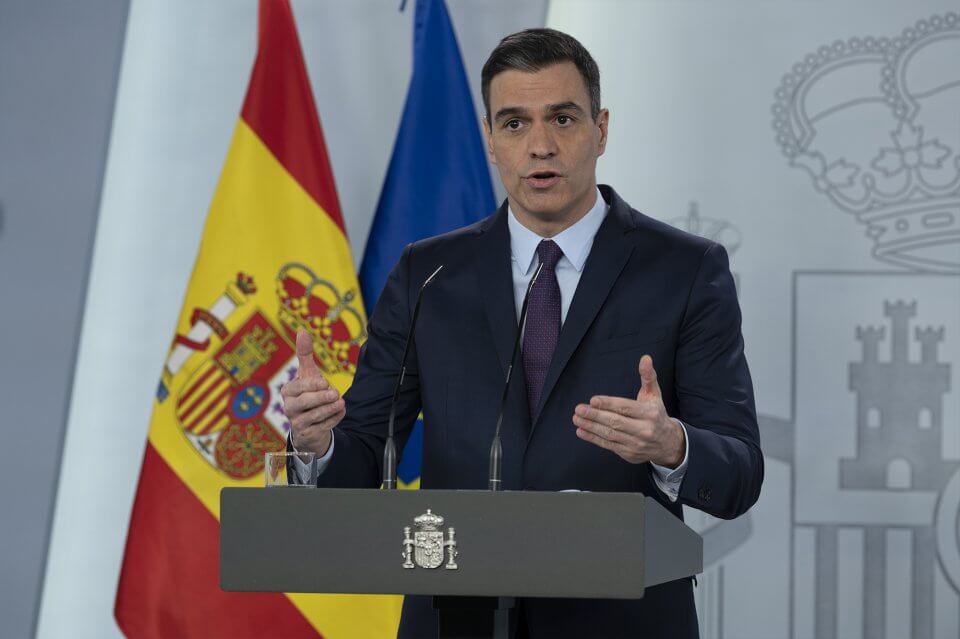Latest: Coronavirus in Spain figures (14 Sept)
Spanish Prime Minister Pedro Sánchez has announced the possibility of ‘regional state of alarms’ in Spain for those regions that require it in order to combat Coronavirus (Covid-19) – as well as 2,000 troops to assist with tracking and tracing.
All the regional governments of Spain ‘can request the state of alarm … [but] talking about the state of alarm is not necessarily talking about confinement’, said Sánchez.
He also announced that 2,000 troops of Spain’s armed forces are going to be made available to Spain’s regional governments to assist with tasks related to tracking and tracing Coronavirus (Covid-19).
Speaking in a press conference on Tuesday following the weekly cabinet meeting, Sánchez said some territories of Spain ‘have achieved greater control and have a calmer scenario than others that have problems coping with the situation’ of Coronavirus.
‘I want to transmit a message of alert and serenity,’ he said. ‘Alert because the evolution is worrying in some territories. Serenity because we are far from the situation in March.’ Whilst admitting that the current situation was ‘worrying’, he also said that it would not ‘paralyse’ the country.
Explaining that 8.5m PCR tests have already been carried out across the country, Sánchez said he wanted to ‘recognise the effort’ currently being made by Spain’s regional authorities.
‘We are not going to allow the pandemic to take over our lives (…) We are going to bend the curve again and we have to do it together.’
During the press conference, the Spanish prime minister also spoke about ‘strengthening the digital tracking means’, calling upon the regions to adopt the new RadarCOVID app.
The app allows users to know whether they have been close to someone who tested positive for Covid-19 within the previous 14 days, using Bluetooth technology.
The app also allows the user to report that they tested positive anonymously and it also anonymously reports that to those who have been in touch with the user. To date, six regions of Spain have adopted the app.

Spain’s ‘State of Alarm’ – background
Spain had originally commenced its national lockdown under the country’s ‘state of alarm’ for two weeks from 14 March, with measures that confined everyone to their homes apart from leaving to purchase food or medication, or to go to their place of work only if they could not perform their duties from home.
After one week, these initial measures were then extended until 12 April, for a second time until 26 April, a third time until 9 May, a fourth time until 23 May, then a fifth time until 7 June. It was then extended for a sixth and final time until 21 June.
During the overall lockdown period, from Monday 30 March until after Easter, further measures were introduced ordering all non-essential workers in Spain to also remain at home. Following the Easter break, industrial and construction workers, as well as non-essential employees in sectors where working from home wasn’t possible, started a gradual return to work.
When the Spanish Congress had voted to extend the state of alarm until 9 May, it also came with the relaxation of some restrictions, specifically allowing children aged up to 14 the opportunity to take daily walks for an hour from Sunday 26 April, after 43 days confined at home.
From Saturday 2 May – after 48 days in confinement – adults across Spain also were allowed out to walk and exercise during set time slots.
When the state of alarm was extended for the last time until 21 June, Pedro Sánchez had announced that it would be ‘different’ and ‘lighter’ than previous times.
The regional governments of Spain regained all their powers to control the de-escalation process from Monday 8 June, the date at which many areas entered Phase Three of the four phased plan to relax the country’s lockdown restrictions. At the same time, the central Spanish government still controlled the decisions over travel between different regions.
Sánchez had also announced that after 21 June, once the final extension to the state of alarm was concluded, citizens would start to have freedom of movement across the whole country, ‘provided there was not a new increase of Coronavirus infections’.
After three months under a ‘state of alarm’, Spain entered its ‘New Normality’ phase on Monday 22 June, following on from the government’s four phased plan to relax the country’s lockdown restrictions.
Also read: Spain’s ‘New Normality’ – key points
Click here for all previous reports on: Coronavirus in Spain
ALSO READ: Catalonia bans social gatherings of more than 10 people
ALSO READ: Catalonia and Castilla La Mancha order the closure of brothels
ALSO READ: Backlash in Valencia against nightlife curfews – plus support for tourism
ALSO READ: Authorities warn of fines following anti-face mask protest in Madrid
ALSO READ: ‘Things are not going well,’ admits Health Ministry (20 August)
ALSO READ: Spain imposes strict new measures on nightlife across the country
ALSO READ: Spain’s GDP fell by 18.5% in second quarter, due to Covid-19 lockdown
ALSO READ: UK-Spain tourism fall-out continues: ‘Many British tourists feel safer in Benidorm than at home’
ALSO READ: Madrid makes face masks compulsory – and imposes nightlife restrictions
ALSO READ: Catalonia to impose fines of up to €15,000 for ‘botellones’ – street drinking parties
ALSO READ: Germany advises against travelling to Catalonia, Aragón and Navarra
ALSO READ: Pedro Sánchez: ‘Safer to be in most regions of Spain than in the UK’
ALSO READ: Spain insists it is ‘a safe country’ for tourism – but cancellations continue
ALSO READ: UK advises against travelling to Spain – and imposes quarantine on return
ALSO READ: Catalonia closes nightclubs and imposes other curfews
ALSO READ: France urges citizens not to travel to Catalonia [in 24 July report]
ALSO READ: EU leaders conclude marathon summit with ‘historic’ rescue package
ALSO READ: Spain honours Coronavirus victims as outbreaks continue
ALSO READ: Face masks to be compulsory in Catalonia – even with social distancing
ALSO READ: ‘New Normality’ decree approved as Health Minister warns ‘danger is still here’
ALSO READ: Face masks to remain compulsory until vaccine found, under ‘new normality’
Sign up for the FREE Weekly Newsletter from Spain in English
Please support Spain in English with a donation.
Click here to get your business activity or services listed on our DIRECTORY


